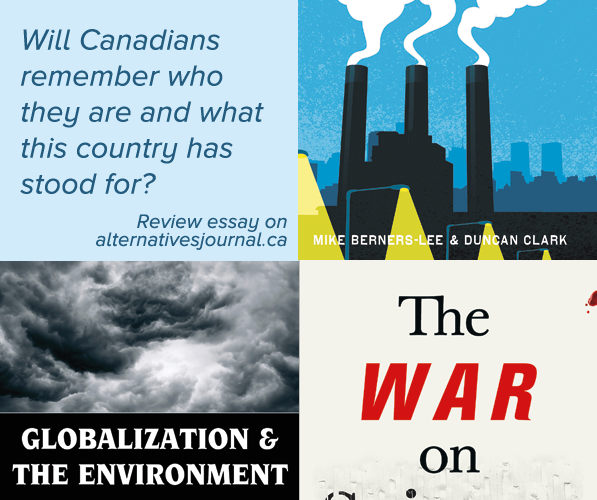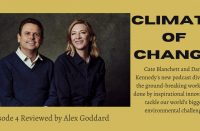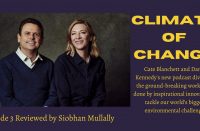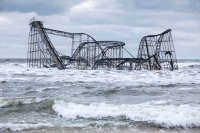Australian scholars Peter Christoff and Robyn Eckersley argue that combatting climate change and meeting other environmental objectives can open new economic opportunities. However, their book Globalization & the Environment also notes that to be successful in the long run requires that “‘growing’ new ecologically sustainable industries … go hand in hand with ‘de-growing’ and phasing-out old, unsustainable industries.”
Australian scholars Peter Christoff and Robyn Eckersley argue that combatting climate change and meeting other environmental objectives can open new economic opportunities. However, their book Globalization & the Environment also notes that to be successful in the long run requires that “‘growing’ new ecologically sustainable industries … go hand in hand with ‘de-growing’ and phasing-out old, unsustainable industries.”
In many countries, unsustainable and outmoded industries use their political power and that of their employees to avoid just fading away quietly. They push for unfair advantages, including subsidies, special tax breaks and deregulation.
In The Burning Question, two British environmental policy analysts make it clear what those old, unsustainable industries are. First on the list is coal. In Canada, the list is dominated by the very industries on which the Harper government is betting our nation’s economic future – most notably tar sands extraction and expanded pipeline capacity. Berners-Lee and Clark come to this conclusion after making a careful case that a significant proportion of the planet’s fossil fuels must be left in the ground. Those fuels can never be used except perhaps as lubricants or in industrial processes if we are to avoid raising average global temperatures more than two degrees Celsius.
The authors conclude that the world can only emit between 700 and 1,600 billion more tonnes of carbon dioxide in total without elevating average temperatures an unacceptable amount. The higher end of those numbers results in a 50-50 chance of avoiding irrevocable climate problems; the lower number offers a 75 per cent chance of avoiding severe problems. Either way we’ll endure much bigger problems than the storms and melting glaciers and ice sheets that we are experiencing now. It is now less a question of how much can be burned each year, but of what fossil energy must be left in the ground permanently.
Is humankind, and its economic and political systems, capable of opting not to use a resource that valuable?
What this means is that absent success with carbon capture and storage, which is far from a proven possibility, we cannot safely burn even the fossil fuels that are already known to exist. The higher-risk 50-50 forecast burns about half of what is known to exist. The lesser-risk option allows burning only about one quarter. The question remaining then is this: Is humankind, and its economic and political systems, capable of opting not to use a resource that valuable?
Other questions include: Which fossil energy should remain in the ground? Who decides? On what basis? And what governing structures could make and enforce that decision? These lines of inquiry in The Burning Question – and the similar argument recently made by Bill McKibben of 350.org – are important because few have taken such questions all that seriously before.
Berners-Lee and Clark’s book also considers another important question: Who owns the fossil fuels and who among them will lose if it turns out that our species is not suicidal? Suicide in this case means burning all the fossil fuels and thereby raising average temperatures by four degrees or more. Given this, rational policies would use the least carbon-intensive fuels like natural gas and abandon carbon-intensive fuels like coal and the tar sands (and certainly not expand them now).
But powerful corporations and states own the fuels and have already borrowed money, issued shares and invested on the assumption that their reserves will be used. They will not just shrug and walk away from those assets, and their economies would not just carry on as if nothing had happened. Trillions of dollars are involved. Protecting the climate is thus a staggering political challenge. This is obvious, given how governments so egregiously handled the 2008 financial meltdown. Public treasuries picked up the tab for massive private investment errors. The tab for a fossil fuel investment bubble could be even bigger, making today’s hyperactive tar sands expansion imprudent in the extreme.
The Burning Question looks closely at the economic implications of excessive investment in fossil fuel extraction. What happens to the pension funds or mutual funds that hold shares in oil and coal firms if it turns out that their largest asset (fossil fuels in the ground) will not be used? A national economy with a diverse industrial and commercial base and a diverse array of energy investments might be able to fare such challenges. Although they do not look at Canada specifically, it is clear what these authors would think of the wisdom of the Harper government’s approach to energy policy.
Canada’s policy will have to change in the not-too-distant future, even though today’s global governance system has thus far been unable to even stop increases in fossil fuel use. What is needed are decisions about what will ultimately be burned, and thus decisions about whose fossil fuels will stay in the ground. How can ‘we’ do that on a global scale? The Burning Question raises this and other clear questions about how we govern ourselves.
Globalization & the Environment
In Globalization & the Environment, Christoff and Eckersley closely examine the global governance system as it is today. They conclude that economic globalization has outrun political globalization. The volume of international trade increased by 32 times between 1950 and 2008, and this has imposed severe environmental costs. They note, however, that global environmental damage predates recent neo-liberal (‘free’ trade-style) globalization and thus is not entirely caused by it. More than that, globalization also spreads ideas about how to avoid or ameliorate such damage. Nonetheless, limiting that damage requires better global governance.
There is a need for a broad acceptance of the responsibilities of global ecological citizenship.
In Christoff and Eckersley’s view, we need to get beyond lowest common denominator global agreements on key problems like climate change and biodiversity. Global environmental rules need to include tough sanctions just as global rules regarding trade do. More than that, there is a need for a broad acceptance by individuals, firms and communities of the responsibilities of global ecological citizenship. Individuals need to be more reflexive about consumption. Governments and businesses need to adjust what they purchase, including the inputs in production processes, in ways that take sustainability concerns – including climate – into account.
In all aspects of Globalization & the Environment, the authors make a detailed and convincing case. They are perhaps at their strongest and most subtle in discussing the long process of modernization and globalization. Global economic integration is in some ways environmentally problematic, but the process of modernization is also cultural and includes the spread of science and the creation and spread of environmentalism itself. A global economy can facilitate the spread of a capacity to recognize and a will to resolve environmental concerns, as well as the spread of the technologies that are necessary to do that.
Thus, neither knee-jerk free-trade advocacy nor simplistic resistance to all aspects of globalization is politically on target.
The War on Science
Chris Turner’s short, beautifully written The War on Science helps us to fully see where Canada fits in this global discussion. Our government pretends that none of these concerns exist. Accordingly it has turned with a vengeance on the scientists who might detect and inform us regarding environmental problems.
Canadian public policies no longer rest on science. Rather, “policy now determines what scientific evidence will be used to inform government and which scientists will be permitted to inform the public.” As Turner also puts it, “the government has opted for willful blindness.” Example after example of this willful blindness is examined. It is a depressing tale of a national government utterly out of step with most of the civilized world.
RELATED: Harper’s Crimes Against Ecology
Turner manages to close on an optimistic note, on a belief that Canadians will remember who they are and what this country has stood for.
But why would intelligent people – and many in Canada’s government are intelligent – in a country with a deep scientific tradition and a history of internationalism reject the nation’s treaty obligations and deliberately undermine the practice of science? I think the answer lies not in a sudden outbreak of ignorance in Ottawa, but in some of Canada’s political and economic leaders understanding Canadian and global politics and realizing that time is running out. They have decided to accelerate and lock in their investments in tar sands extraction and infrastructure in a way that assures there is no turning back without severe economic repercussions, which they are betting will be avoided regardless of the costs. These leaders then see science itself as an impediment to the implementation of key national policy objectives. In this they are not wrong factually, they are wrong morally.
Turner manages to close on an optimistic note, on a belief that Canadians will remember who they are and what this country has stood for. I hope he is right. We will know within a few years whether Canada will return to helping the world move forward or will continue to be a leading roadblock to progress toward effective global governance in challenging times.
The Burning Question: We can’t burn half the world’s oil, coal and gas. So how do we quit? Mike Berners-Lee and Duncan Clark, Vancouver: Profile Books, 2013, 268 pages.
Globalization & the Environment, Peter Christoff and Robyn Eckersley, Lanham, MD: Rowman & Littlefield, 2013, 256 pages.
The War on Science: Muzzled Scientists and Wilful Blindness in Stephen Harper’s Canada, Chris Turner, Vancouver: Greystone Books, 2013, 170 pages.
Reviewer Information
Robert Paehlke is a professor emeritus at Trent University where he taught environmental policy and politics for 35 years. About 40 years ago, he envisioned a magazine that was both scientifically sound and journalistically interesting, and Alternatives was born. “Bob P,” as we call him, sits on the magazine’s editorial board and he contributes articles and blog posts as often as we can trick him into it.
He is the author of Environmentalism and the Future of Progressive Politics (1989), Democracy’s Dilemma: Environment, Social Equity and the Global Economy (2004), Some Like It Cold: The Politics of Climate Change in Canada (2008) and Hegemony and Global Citizenship (2014).





 You might also like “
You might also like “






